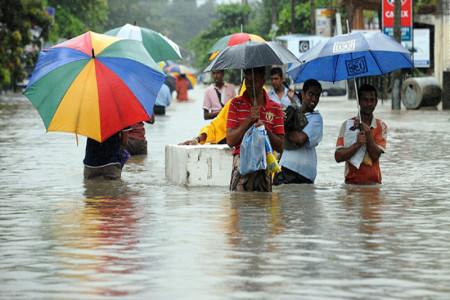According to Sri Lanka’s Disaster Management Centre (DMC) over 253,500 persons from more than 66,900 families had been affected. More than 40 houses were completely destroyed and over 4,000 partially damaged.
Several villages and paddy fields were inundated in the Southern Province, compelling people to take shelter in schools and temples.
Sri Lanka incurs Rs 50 billion (US$313 million) in annual disaster losses related to housing, infrastructure, agriculture, official data shows.
Of this amount damages from floods was around Rs 32 billion, cyclones and high winds Rs 11 while droughts and landslides caused Rs. 5.2 billion and Rs.1.8 billion in damages respectively.
The frantic situation facing flood affected people is a direct result of the failure of successive governments to tackle basic infrastructure issues and implement long term sustainable flood management programs, policies and legislations, former finance minister Ravi Karunanayake said.
Citing an example he noted that he has introduced a natural disaster insurance scheme via national insurance trust fund board with foeign reinsurer allocating Rs 330 million from 2016 budget with the consent of the then Prime Minister Ranil Wickremasinghe
It had been able to pay Rs15.8 bilion as natural disater compamstaion in 2016 and Rs17 billion by allocating Rs. 590 million from 2017 budget without burdening the treasury, he claimed.
He disclosed that a new tax called the Crop Insurance Levy has been charged from banks, finance and insurance companies with a view to covering damages suffered by the farmers due to a series of natural disasters at that time.
The levy amounting to one per cent of these institutions’ after-tax profit has been remitted to an account maintained and administered by the NITF. All these pragmatic measures and the natutral insurence scheme are now not in existence he added.
Sri Lanka is facing the catastrophic consequences due to non-implementation of strategic city development projects and river diversion irrigation and flood control schemes initiated during 2015 and 2019 periods.
Mr. Karunaayake who was spear headed in flood relief campaign in the Western province specially in Colombo and suburbs voluntarily, noted that the impact on flood was most heavily on the poor and those people were suffering because of not continuing flood management initiatives launched in 2015- 2016 by the then government subsequent to heavy flooding.
He emphasised the need of pragmatic plans that cover the whole country, particularly the flood prone areas for the benefit of long-suffering people living there and these plans should be implemented by enacting laws to make it everlasting and sustainable.
The government machinery comprising agencies connected to disaster management, meteorology, irrigation and other relevant institutions should be revamped making officials more efficient and duty conscious providing intensives for them while taking disciplinary action against saboteurs, he emphasised.


